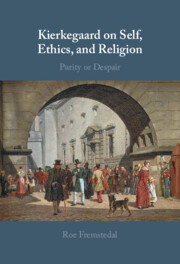Book contents
- Kierkegaard on Self, Ethics, and Religion
- Kierkegaard on Self, Ethics, and Religion
- Copyright page
- Dedication
- Contents
- Figures and Tables
- Acknowledgments
- Abbreviations
- Introduction
- Part I Self, Despair, and Wholeheartedness
- Part II Morality, Prudence, and Religion
- Chapter 4 The Critique of Eudaimonism: Virtue Ethics, Kantianism, and Beyond
- Chapter 5 Noneudaimonistic Ethics and Religion: Happiness and Salvation
- Chapter 6 The “Teleological Suspension of the Ethical” and Abraham’s Sacrifice of Isaac
- Chapter 7 Moralized Religion: The Identity of the Good and the Divine
- Part III “Subjectivity, Inwardness, Is Truth”
- Part IV Faith and Reason
- References
- Index
Chapter 7 - Moralized Religion: The Identity of the Good and the Divine
from Part II - Morality, Prudence, and Religion
Published online by Cambridge University Press: 27 January 2022
- Kierkegaard on Self, Ethics, and Religion
- Kierkegaard on Self, Ethics, and Religion
- Copyright page
- Dedication
- Contents
- Figures and Tables
- Acknowledgments
- Abbreviations
- Introduction
- Part I Self, Despair, and Wholeheartedness
- Part II Morality, Prudence, and Religion
- Chapter 4 The Critique of Eudaimonism: Virtue Ethics, Kantianism, and Beyond
- Chapter 5 Noneudaimonistic Ethics and Religion: Happiness and Salvation
- Chapter 6 The “Teleological Suspension of the Ethical” and Abraham’s Sacrifice of Isaac
- Chapter 7 Moralized Religion: The Identity of the Good and the Divine
- Part III “Subjectivity, Inwardness, Is Truth”
- Part IV Faith and Reason
- References
- Index
Summary
Chapter 7 discusses the relation between ethics and religion in Kierkegaard’s signed and pseudonymous writings. It is shown that – despite appearances and despite influential commentators – religion cannot possibly conflict with ethics. There is not only strong textual evidence ruling out such conflict but also principled reasons, showing that there is no conceptual room for such conflict, since Kierkegaard is a Christian Platonist who identifies the good with the divine. Indeed, his account of religion is clearly moralized since he takes religion to concern practical questions of how to live morally. For Kierkegaard, religion thus entails ethics and vice versa, although we must distinguish between Christian and non-Christian variants of both. Still, he holds that the former can override the latter to some extent. But this does not involve any break with ethics (as such) or any moral exceptionalism that is beyond or above morality. Instead of suspending ethics, Kierkegaard stresses the overriding nature of morality, seeing what we ought to do all-things-considered as a specifically ethico-religious question. His position is therefore far less problematic than normally assumed.
Keywords
- Type
- Chapter
- Information
- Kierkegaard on Self, Ethics, and ReligionPurity or Despair, pp. 121 - 138Publisher: Cambridge University PressPrint publication year: 2022



